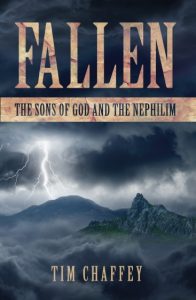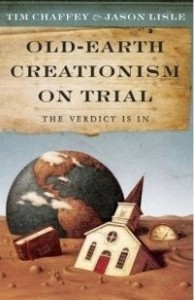
My introduction to biblical theology in seminary was through this book by Zuck, Merrill, Bock, et. al.
In the first post of this series, I set out to define biblical theology. As I mentioned there, it can be challenging to provide a succinct definition for biblical theology, in part because it requires plenty of nuance. This is why I contrasted it with systematic theology, so that we can see how it differs from the way that most Christians in the West, and particularly apologists, tend to think about biblical teaching. The contrast between these two approaches to theology will continue to show up in this series.
In that post, we looked at how biblical theology provides a strong argument in favor of interpreting the six days of the creation week in Genesis 1 as normal-length days. In this post and the next, we will look at another passage from Genesis 1–11 to see how biblical theology can help us acquire a better understanding of these chapters.
Genesis 6:3 and Systematic Theology
The proper interpretation of Genesis 6:3 has been disputed for many years. One of the reasons for this has to do with the ways in which it has been translated. This is how it reads in the NKJV.
And the LORD said, “My Spirit shall not strive with man forever, for he is indeed flesh; yet his days shall be one hundred and twenty years.”
Two popular interpretations have arisen from this passage. Among creationists, it is often taught that this pronouncement from God was given 120 years before the great Flood. Thus, man was essentially given a 120-year countdown to repent. The alternative view is that God was going to drastically reduce man’s maximum lifespan from nearly 1,000 years to just 120 years. Let’s refer to these as the countdown and lifespan views, respectively
Supporters of these positions often use systematic theology to defend their interpretation of this passage. For example, those favoring the countdown view will point out that for more than a dozen generations after this verse, people were still living well beyond 120 years. Noah lived to 950 years, his son Shem reached 600 years, and Shem’s son Arphaxad made it to 438. Even Abraham, many generations later, lived 175 years. So, how could this passage be about setting a limit of 120 years on man’s lifespan? Also, this verse appears in the same chapter where God announced the judgment of the Flood, so this must be the context in which we interpret the verse. And the Apostle Peter seems to support this position when he stated that God waited patiently to carry out judgment while Noah built the Ark (1 Peter 3:20). Taking these three arguments together, it may seem obvious that this verse should be understood as teaching that God gave mankind 120 years to repent.1 But…
Whenever you only hear one side of the argument, you should keep in mind the following verses from Proverbs 18.
“He who answers a matter before he hears it, it is folly and shame to him.” (Proverbs 18:13)
“The first one to plead his cause seems right, until his neighbor comes and examines him.” (Proverbs 18:17)
A common point in both of these proverbs is that no one should give an answer before he carefully examines the details from both or all sides. In this situation, we haven’t even looked at the arguments for the lifespan view or considered how supporters of this view might respond to the argument raised against it in the previous paragraph. And we haven’t checked to see if there are strong arguments against the countdown view. We will turn our attention to all three of these issues after a quick observation about how the arguments raised so far relate to biblical and systematic theology.
Notice that the arguments for the countdown view came from a systematic approach. The positive arguments (the passage is in the chapter that introduces the Flood and 1 Peter seems to support it) and the negative argument (the lifespan view seems to have a fatal flaw) are not drawn from careful exegesis of Genesis 6:3 or from an analysis of the themes and narrative of the passage. Instead, proponents of the countdown view call upon details found later in the Bible and attempt to apply logic to rule out the alternative view, which would leave their own view standing alone. To be fair, there are times when those who favor the lifespan view will do something similar. As I mentioned in the first post, there is nothing wrong with using a systematic approach, if it is done correctly. But if it is done prior to doing exegesis and biblical theology, then one runs the risk of overlooking some key details, and I believe that is precisely what has happened here.
Delayed Judgment? No Problem
The argument against the lifespan view is not as strong as many people think. Should we automatically reject the view because people were still living well beyond 120 years for many generations after God announced the judgment? In fact, it wasn’t until the time of Moses, more than a thousand years later, that man’s lifespan dropped to 120 years. If there is such a delay in the judgment, how could anyone attribute the reduction in man’s lifespan to the passage in Genesis 6:3? Two responses need to be made to this question.

An entire chapter in my book Fallen: The Sons of God and the Nephilim is devoted to addressing the meaning of Genesis 6:3.
First, while it is true that Moses was the first one mentioned in the line from Noah through Abraham to Moses who did not exceed 120 years—he died when he was 120 years old (Deuteronomy 34:7). However, the generation after Noah saw a significant drop in lifespan. Noah lived 950 years (Genesis 9:29), but his son Shem died at 600 (Genesis 11:10–11). The next three generations reached the 400s, but the following generations only reached the 200s, and by the time of Abraham, lifespans had dropped under 200 years. Using biblical theology, we should look at these details from the perspective of the Israelites in the years following their exodus from Egypt. They would have recognized the immediate decline in lifespans from Noah’s time down until their own time when people no longer outlived 120 years, so it would have been easy for them to connect Genesis 6:3 with a judgment on man’s lifespan. We’ll have more to say on this point later.
Second, the argument about delayed judgment proves too much because the countdown view is also, by definition, a form of delayed judgment. If God were truly telling humanity that they had 120 years to repent, is that not also a delayed judgment? And it if is acceptable to think that God had delayed judgment for 120 years, then why is it not also acceptable to think that he delayed or partially delayed it for several generations? I added “partially delayed” because man’s lifespans started declining immediately following this, so it wouldn’t be fair to say that the entire judgment was deferred for many generations.
There are other instances where God delayed a judgment for many generations. He essentially gave the wicked Amorites at least 400 years to turn from their evil ways (Genessi 15:13–16). He gave His people 490 years to faithfully carry out their covenant with Him concerning their land, but they failed to allow the land to lie fallow every seventh year for nearly 500 years, which is why God kicked them out of their land for 70 years (2 Chronicles 36:21; Jeremiah 25:11). So, there is nothing unusual with God’s judgment taking several generations to be fully realized.
Problems with the Countdown View
There are some significant problems with this view that are often overlooked. One issue that should concern advocates of the countdown view is that most commentators on Genesis do not agree with them. For example, the commentaries by Alter, Brueggemann, Cassuto, Sailhamer, Sarna, Westermann, Wenham, Matthews, and von Rad favor the lifespan view. Many others either gloss over the issue altogether or simply list both views as possibilities. Very few favor the countdown view, and the earliest writer I could find who adopted this view was Augustine in the early fifth century. While this may offer comfort to countdown advocates, I would not place much stock in Augustine’s words given his frequent forays into allegorical interpretation.
The proper interpretation of a passage will not be decided by how many commentators, or which commentators agree or disagree with a particular view, even though their writings can be rather instructive. Ultimately, we need to search the Scriptures like the Bereans commended in Acts 17:11, and it is here where we find some major problems with the countdown view. Let’s take another look at Genesis 6:3.
And the LORD said, “My Spirit shall not strive with man forever, for he is indeed flesh; yet his days shall be one hundred and twenty years.”
Before engaging in systematic theology, we need to figure out what the verse actually says rather than assuming an interpretation and searching the rest of the Bible to find arguments for or against a preferred position. When we do this, we will see some major difficulties for the countdown view.
Problem #1 – Who heard the Lord say these words?
Did you notice that this verse never tells us who God spoke these words to? Proponents of the countdown view sometimes assume that he was speaking to Noah, who would have been 480 years old at the time, if this view is correct. But this is an idea read onto the text—it certainly never tells us this. The verse just tells us that God spoke these words. Up until this point in Genesis, whenever God had spoken to people or to the serpent, it always tells us who He was addressing (see Genesis 1:28–30; 2:16–17; 3:9–19; 4:6–15). Whenever His words were not addressed to those on earth (whether it was “inter-trinitarian” dialogue or He was speaking to members of the divine council or heavenly court), it does not tell us who He is speaking to (see Genesis 1:3, 6, 9, 11, 14–15, 20, 24; 2:18; 3:22). Since Genesis 6:3 does not tell us who God addressed, then based on the trends we have seen in the first five chapters of Genesis, we have good reasons to believe that He was not speaking to a man. Instead, it makes much more sense to interpret this as inter-trinitarian dialogue or God speaking to other heavenly beings.
If God did not speak these words to men, then the countdown view loses most of its explanatory power. Part of the appeal of the countdown view is that it sees God as giving mankind a warning, showing that He is longsuffering because He is giving them so much time to turn from their wicked ways. In this way, it would be similar to Jonah preaching to the Ninevites, telling them that Nineveh would be overthrown in 40 days (Jonah 3:4), but in this case, it would have been 120 years. However, if God never spoke these words to man, how would anyone know that they had 120 years to repent? After Jonah delivered his message, we are told that the people of Nineveh repented, which was an appropriate response. However, there are no statements following Genesis 6:3 that tell us how people did or did not respond to this supposed warning. Furthermore, Jesus seemed to indicate that the people of Noah’s time “did not know” (Matthew 24:39) that the Flood was coming to judge them.
Problem #2 – Strive or Abide?
This point will be a bit technical because it has to do with how this verse should be translated. At the heart of this difficulty is the word translated as “strive” in the NKJV (see also KJV and NASB or “contend” in the NIV). In many other Bibles, this term is translated as “abide” (ESV, NRSV), “remain” (NET, HCSB), or something similar. For example, the ESV states, “Then the LORD said, ‘My Spirit shall not abide in man forever…’” There is a big difference between God saying that His spirit would not strive or contend with man forever and stating that His spirit would not remain in or abide in man forever. The NET Bible includes a helpful textual note to explain how two vastly different concepts could be translated from the same term. [Note: the Hebrew letters don’t translate properly in WordPress. The entire note can be viewed here at NetBible.org — see note 5.]
The verb form ?????? (yadon) only occurs here. Some derive it from the verbal root ????? (din, “to judge”) and translate “strive” or “contend with” (so NIV), but in this case one expects the form to be ?????? (yadin). The Old Greek has “remain with,” a rendering which may find support from an Arabic cognate (see C. Westermann, Genesis, 1:375). If one interprets the verb in this way, then it is possible to understand ????? (ruakh) as a reference to the divine life-giving spirit or breath, rather than the Lord’s personal Spirit.2
In the New International Dictionary of Old Testament Theology and Exegesis, Richard Schultz explained that this verb is likely derived from dun (instead of din), as supported by the Septuagint, Latin Vulgate, and modern etymological research.3 This would mean that the verb should be translated in a way that conveys that God’s spirit would not continue or last with or in man.
Problem #3 – The Problem Is Not Resolved
For the sake of argument, let’s assume that the Hebrew term should be translated as strive or contend, which is essential for the countdown view. There is still another issue for this position. That is, according to this understanding, God was going to do something that would resolve the problem of His spirit striving or contending with man. That something was the Flood. However, the Flood didn’t truly solve the problem because sinful man is still on the earth, and God’s spirt is still striving or contending with sinful man, just as before the Flood. At best, the Flood just minimized the problem for a little while, but it would not take long for man’s rebellious ways to proliferate.
To Be Continued…
The second half of this article will be posted soon. Now that we have covered some of the problems with the countdown view and the major objection to the lifespan view, we need to make a positive case for the latter. That will be the focus of the next post in this series, and we will also look at some plausible reasons why a reduced lifespan was an appropriate punishment for people at that time.
Thanks for reading!
Creationists have proposed other reasons for the rapid decline in man’s lifespans. One idea is that God may have done something to our genetics to cause this, such as speeding up the rate at which our telomeres shorten. This would presumably place a shorter limit on the amount of time our cells could divide, which would lead to shorter lifespans. Some have pointed to the lifespan of Noah’s father, Lamech, who lived 777 years and died five years before the Flood. Perhaps a mutation in his genetics led to his shorter lifespan compared to his ancestors. However, the Bible does not tell us whether Lamech died of natural causes. Since the world was filled with violence at that time, it is not a stretch to think that he may have been killed by others. Also, Noah still lived 950, so it’s unclear if he had some mutated gene for a shorter lifespan. ↩
Biblical Studies Press. 2005. The NET Bible First Edition; Bible. English. NET Bible.; The NET Bible. Biblical Studies Press. ↩
VanGemeren, Willem, ed. 1997. In New International Dictionary of Old Testament Theology & Exegesis, 1:940. Grand Rapids, MI: Zondervan Publishing House. ↩



